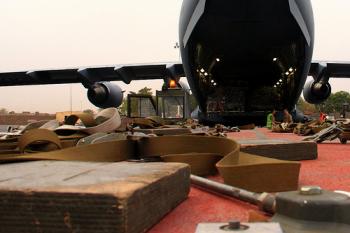Change the conversation, support rabble.ca today.
Responding to increased public disapproval of the on-going Canadian military mission in Mali, Foreign Affairs Minister John Baird told the House Foreign Affairs Committee on Tuesday that Canada would not want to do more in Mali, as the situation there turns into an insurgency.
Baird’s remarks come in stark contrast to the Conservatives’ tough rhetoric on the threat of “Islamic terrorism” which was used to justify Canada’s military involvement in the West African nation.
Last month, Canada extended its military support mission to French troops fighting rebels and Islamists in the West African nation of Mali.
The Canadian mission comprising 40 Canadian Forces personnel and a C-17 Globmaster transport plane was originally scheduled for one week and is now due to continue until February 15. The Prime Minister also seemed prepared to broaden the mission’s mandate and provide extra military assistance to the French.
All of this comes less than two years after another Canadian military involvement in Africa helped topple the regime of the late Muammar El Ghaddafi of Libya in 2011.
Canadian military involvements in Libya and Mali must be understood in the context of a larger project initiated by the Harper government to militarize Canada’s foreign policy. This project risks diminishing Canada’s long and well-established international humanitarian legacy while also costing us a fortune at home in times of great economic uncertainty.
Immediately after his re-election in 2011, Prime Minster Harper underscored the militant direction of his government’s foreign policy in his triumphalist speech to the Conservative Party faithful when he stated that “power is shifting. New forces are coming to the fore.”
Harper declared: “some we will be pleased to work with. Some we must resist. In such a world, strength is not an option; it is a vital necessity”. What was then dubbed the Harper Doctrine has since become a reality that cost Canadian taxpayers billions of dollars spent in dramatic re-equipments of the army, the air force and the navy.
The problem with Mr. Harper’s worldview is that it ignores the efficacy of soft power and diplomacy and reduces the world to a mere jungle. Although Canadian military involvement in Libya was part of a UN-manadted effort and Mali’s mission is carried out in the backdrop of an increasing global consensus, both missions represent a drastic departure from the traditional role which our military played abroad.
We have for so long chosen to fulfill our international moral and humanitarian obligations without having to swell our military muscles, engage in combat missions and commit increasing numbers of our armed forces to conflicts overseas.
We sent our armed forces overseas in support of peacekeeping operations in many parts of the world, and we were widely hailed by the international community for those achievements. So, why the need to increasingly go on the offensive? This is the question, which Canadians should be asking, as this government continues its belligerent hawkish posturing in a world already doomed by war and conflict.
Humanitarianism has been a cornerstone of Canada’s foreign policy for longer than many of us can probably remember. Lester Pearson’s Nobel Peace Prize for resolving the Suez crisis in 1957 is matched only by the faith we, as a nation, have in our goodwill and deeds when dealing with the world. Investing generously in peace keeping, humanitarian assistance and development abroad has awarded Canada a venerated seat on the international stage as a peace loving nation, an honest conflict broker and a reliable partner in economic and social development. This is the Canada the world knows. But more importantly, this is the Canada the world needs.
In an increasingly polarized and economically stagnant world, Canada is needed more than ever. But which Canada does the world really need? Certainly, the world needs a Canada which can play an honest conflict broker and a committed peace-maker. Canadians need the Canada that doesn’t provoke enmity towards Canadians by engaging in senseless military adventures in a continent already ravaged by conflict and poverty.
With its rich cultural diversity and fine international humanitarian legacy, Canada has the potential to bridge the world. This potential is increasingly being diminished as Canada chooses to stay more on the offensive and as the world’s perception of Canada changes consequently.
The world needs the Canada that invests, not in military adventures abroad, but in enhancing human capital and potential through development and humanitarian assistance to poor nations. The world needs more of the Canada it has known, and Canadians need to rescue the Canada they have worked very hard to establish in the international stage before it is too late.
Yassir Karooka is a Torornto-based writer. He studied Economics and Political Science at the University of Toronto and is now completing a graduate degree in International Development at York University. Yassir previously worked for the United Nations and the International Organization for Migration. He is currently a Teaching Assistant with York University.
Photo: Brandi Hansen, U.S. Air Force/Released/Flickr



